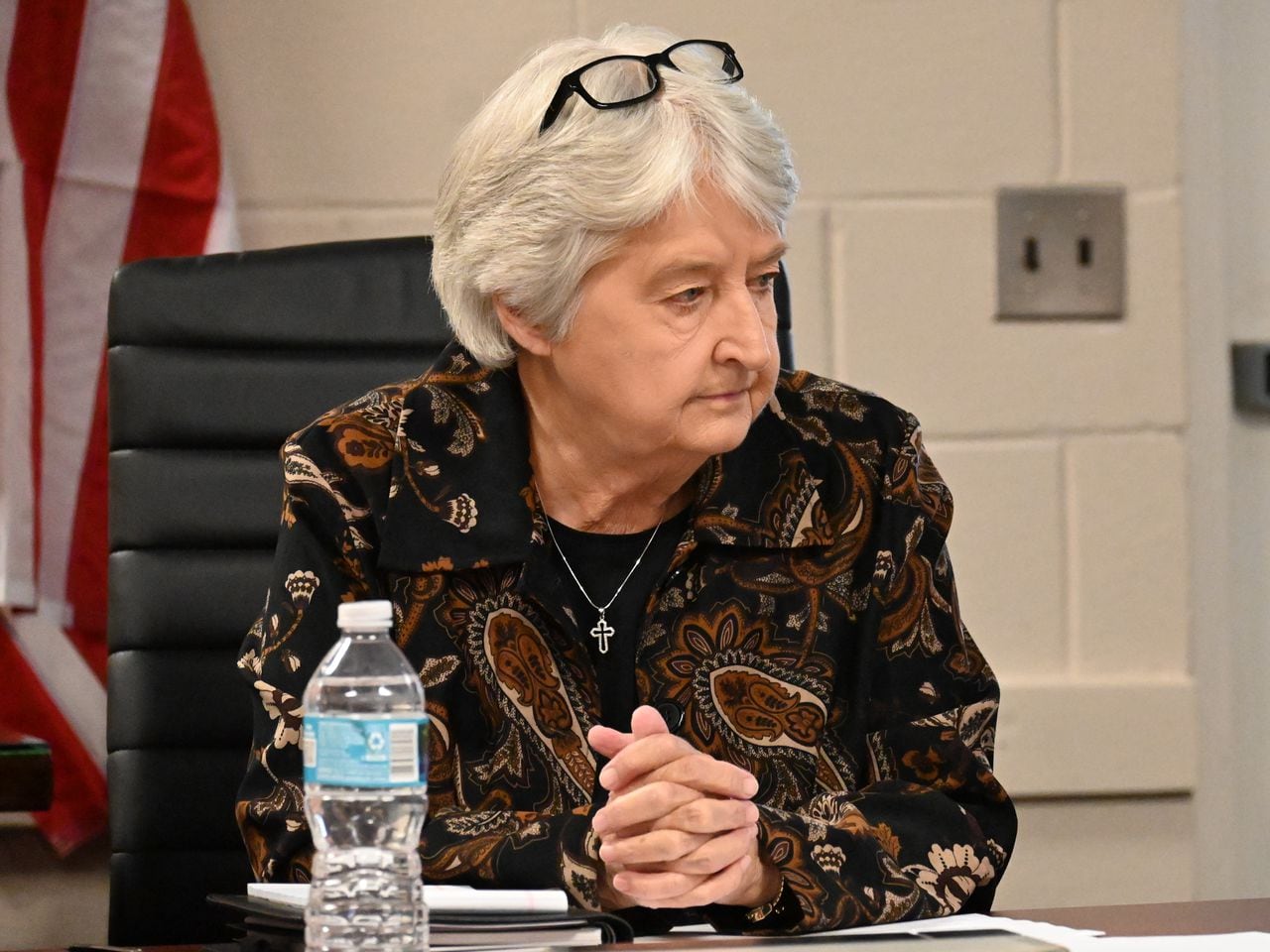Grand jury secrecy looms large over bodycam transparency, journalists arrests
Alabama’s 48-year-old grand jury secrecy law looms over two separate cases that are drawing national attention while raising questions over what constitutes legitimate legal secrets in South Alabama.
The two cases in Mobile and Atmore are unrelated to each other but are occurring almost simultaneously. They are also coming less than a year after a federal appeals court ruled that Alabama’s grand jury secrecy law is constitutional and doesn’t infringe upon a person’s freedom of speech.
- In Mobile, authorities warned elected officials last month that granting a family its wishes by allowing them to view body cam footage of Jawan Dallas’ death during an altercation with police in July could land them in criminal hot water. The reason? A felony violation to the state’s grand jury secrecy law.
- In Escambia County, charges of violating the grand jury secrecy law were issued in October against the publisher and reporter of The Atmore News after the newspaper released a story that allegedly contained grand jury secrets.
The charges in the Atmore case have jolted free press advocates, who have said that District Attorney Steve Billy is violating the First Amendment by pursuing a prosecution of a newspaper for reporting news.
“I think he’s totally off-base on his interpretation of it,” said Brewton attorney Ernest White, who represents publisher Sherry Digmon and reporter Don Fletcher. A preliminary hearing into their case over revealing grand jury evidence is set for a preliminary hearing before Judge Ben Fuller at 9 a.m. on Dec. 4, at the Escambia County Courthouse in Brewton.
Billy has declined to comment. A preliminary hearing is set for 9 a.m. Monday at the Escambia County Courthouse.
Scholars say the Alabama law is confusing and can be interpreted widely by different attorneys. Other aspects of the law also raise concerns, they note: That prosecutors are not subject to criminal liability for disclosing the same grand jury secrets the law aims to protect, and witnesses are forbidden from disclosing grand jury proceedings – an obligation that only about a dozen states impose.
Past legislative efforts to free witnesses from the secrecy hold have failed to advance in the Alabama Legislature.
Prosecuting journalists
Escambia County School Board member Sherry Digmon, who is also the publisher and co-owner of The Atmore News, attends the board’s meeting on Tuesday, Nov. 29, 2023, in Atmore, Ala.John Sharp/[email protected]
The big question in the cases stirring in Mobile and Atmore is this: Where does a felony begin or end when it comes to disclosing evidence or materials in the hands of a grand jury?
“There is some argument on whether that circle goes outside the grand jury room,” said Matt Woodham, assistant professor of law and assistant director of trial advocacy at Samford University’s Cumberland School of Law. “The important part is there are these categories of people who, if they make this disclosure, they would have committed a felony.”
Under Alabama law, no past or present grand juror, witness, reporter, or stenographer – all members of the grand jury process – may reveal or disclose grand jury proceedings or physical evidence.
The grand jury secrecy act, enacted in 1975, also says that “nor shall any person at any time” attempt to corrupt or influence a grand juror.
Prosecutors are exempt from the law.
Woodham said he does not believe a newspaper reporter, who is not included in the grand jury proceedings, falls under the disclosure penalties. A violation to Alabama’s grand jury secrecy law is a felony punishable by up to three years in prison.
“By my reading of the law, since the owners of the newspaper are not witnesses, grand jurors, grand jury court reporters, writing (the article in question) is not a direct violation of the law,” he said. “The theory of prosecution for the owner of the newspaper, even if they published a grand jury secret, by doing that alone is not a crime.”
He added, “Based on my understanding of that case and my reading of the grand jury secrecy act, the only possible theory that would result in liability under the act would have to result from accomplice liability. I do not know what, if any, facts from that case would support such a theory.”
He said that a journalist, to be guilty of violating the law, would have to be accomplices to a crime “by soliciting or otherwise aiding an unlawful disclosure of a grand jury secret by a grand juror, grand jury witness, or court reporter.”
“There is no indication that occurred in Atmore, though the case remains under investigation,” Wodham said. “If we are dealing with a case where a grand jury witness leaves information in the mailbox at the paper (and the journalist) gets this information and publishes it, with them being charged as I understand it, then I don’t see where that conduct of just publishing violates this law.”
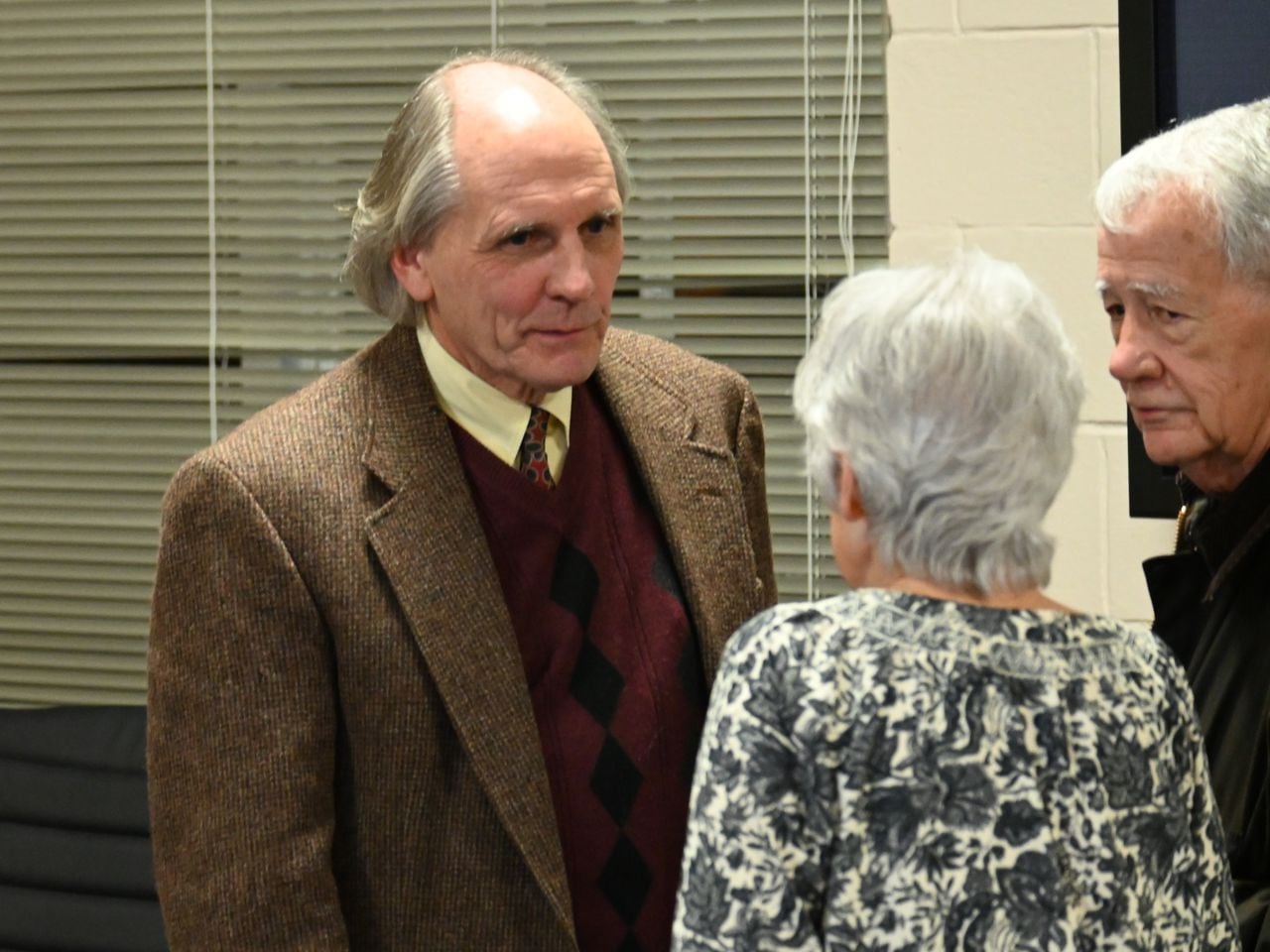
Escambia County District Attorney Steve Billy speaks with the parents of Superintendent Michele McClung during a break at the Escambia County School Board’s meeting on Tuesday, Nov. 28, 2023, in Atmore, Ala.John Sharp/[email protected]
Fletcher and Digmon face a charge of revealing grand jury secrets for reporting that authorities were investigating the Escambia County School Board’s handling of COVID-19 relief funds after allegedly receiving a copy of a grand jury subpoena in the mail.
Also facing indictment is Ashley Fore of Brewton, a bookkeeper with the school system who is accused of revealing grand jury evidence to the journalists.
“The person who committed the crime is the one that disclosed it to the news organization,” said Kelly McBride, chair of the Craig Newmark Center for Ethics and Leadership at the Poynter Institute. “The news organization published information they received. That’s different. There is a nuance there. Otherwise, the way you interpret the law is prior restraint, which is generally frowned upon as a violation of the free press protections of the First Amendment.”
Bodycam evidence
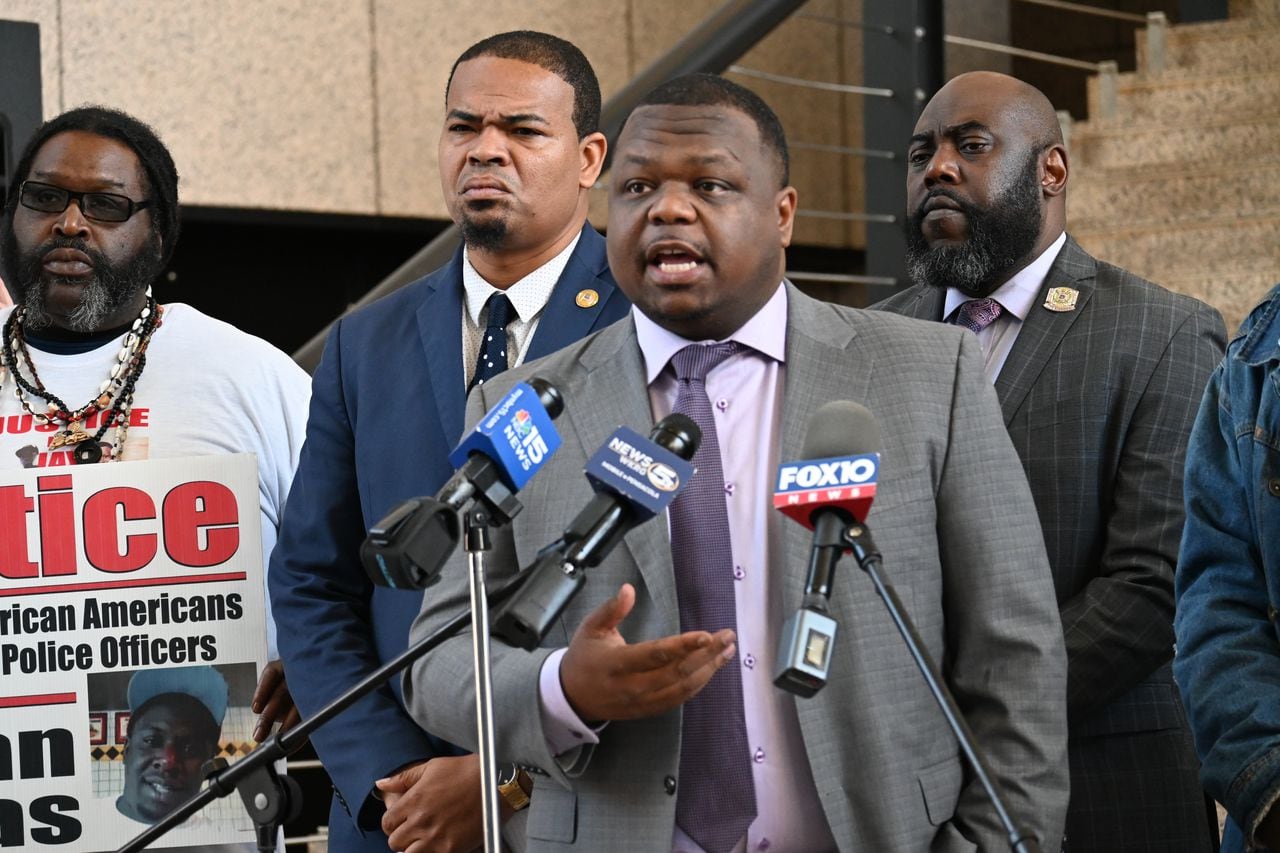
Harry Daniels, an attorney representing the family of the late Jawan Dallas, speaks during a press conference on Wednesday, Nov. 22, 2023, at Government Plaza in Mobile, Ala. The conference was held after Daniels and family members of Jawan Dallas reviewed the footage of the police-worn body camera taken on July 2, 2023, when Dallas died following an altercation with police.John Sharp/[email protected]
In Mobile, concerns of a potential violation of grand jury secrecy halted the release of information related to the death of 36-year-old Jawan Dallas on July 2, after he had a violent encounter with Mobile police.
At the heart of the concerns was the handling of police-worn body cam footage. For months, the Dallas family pled with Mobile city officials to allow them to review the footage only to be told that any efforts to do so could be a felony as a violation of the state’s grand jury secrecy act.
Efforts by AL.com and other media organizations to obtain a copy of the autopsy report were also denied.
The Mobile City Council was also given a rare warning from City Attorney Ricardo Woods: If you push to allow the Dallas family to review grand jury evidence, you could be committing a felony.
Woodham said he does not believe the grand jury secrecy law prevents law enforcement officers from allowing family members of a crime victim from viewing bodycam footage of a police altercation.
“The fact that a grand jury might one day see the video or even if they already have does not make the video a secret that magically cannot be disclosed by any person,” said Woodham.
The timing of the disclosure seems to be the issue. Within 24 hours after a deadly Nov. 13 police raid in Mobile, the mother of a 16-year-old Black teen who was shot and killed during an encounter with police was allowed to watch the police-worn body cam video footage. City officials allowed the viewing because the footage had not yet been forwarded to authorities for a grand jury investigation.
In the Dallas case, the video was not made available because it had already been wrapped up in a grand jury proceeding by the time the family allegedly was inquiring to view it.
A spokeswoman for Mobile County District Attorney Keith Blackwood — who announced earlier this month that the grand jury would not be pursuing criminal charges against the police officers involved in the Dallas encounter — said the same courtesy to view bodycam footage was that was offered to the family of the 16-year-old teen was also offered to the Dallas family ahead of the grand jury proceedings.
Tara Zieman, spokeswoman for Blackwood, said she was not 100% sure on the timing.
“Timing of body cam footage should be a city question as we have different roles in this process and they are the ones who will show the footage,” she said. “That will never be the role of the DA’s office.”
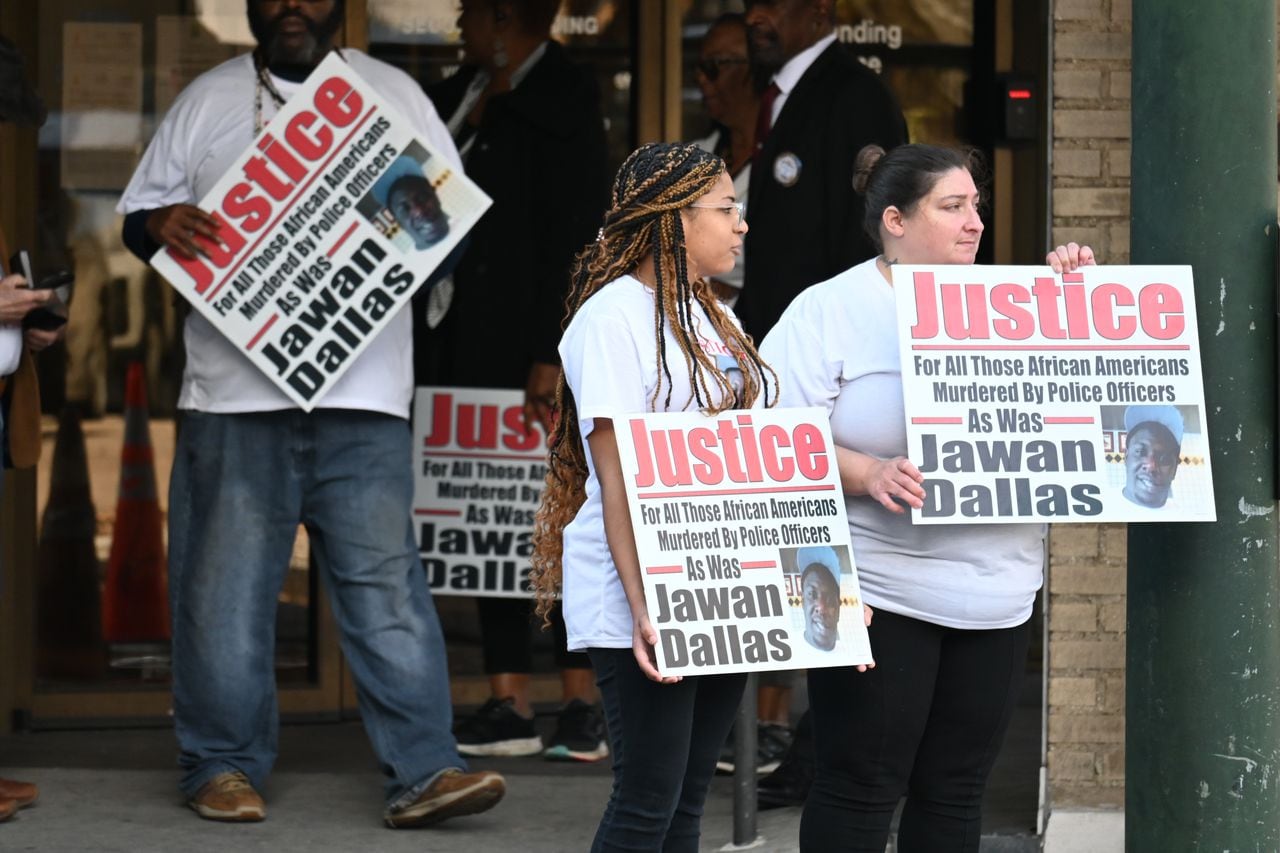
A press conference was held on Wednesday, Nov. 22, 2023, at Government Plaza in Mobile, Ala., after the attorney and family members of Jawan Dallas reviewed the footage of the police-worn body camera that showed a deadly police altercation with the 36-year-old Mobile man.John Sharp/[email protected]
The Dallas family, after 4-1/2 months of requests, got to see the bodycam footage last week. The footage has not been released to the public.
Two different viewpoints over how Dallas died have since emerged: City and police officials, and Blackwood have said that Dallas died from health factors and drug use; attorneys for the Dallas family claim that he was beaten by police and repeatedly tased while pleading for his life.
Public bodies are not required under Alabama state law to release body cam footage to the public, meaning it is unlikely the general public or press will be able to ever view the video.
“There is public interest in that sort of material,” said McBride. “If they are not releasing body cam (footage), they are hiding something. The whole point of body cam video is so the public can have a view of what is happening in these exertions of power.”
She said that authorities withholding information about the case because it went before a grand jury represents an “overreach” of the state law.
“Unfortunately, you live in a state (Alabama) where there are relatively few media organizations,” McBride said. “If there was a lot, you could get together and fight for this kind of access and this type of overreach. With relatively few, it’s hard to influence the laws and public policies that would make the state more transparent to the citizens it governs.”
Reform efforts
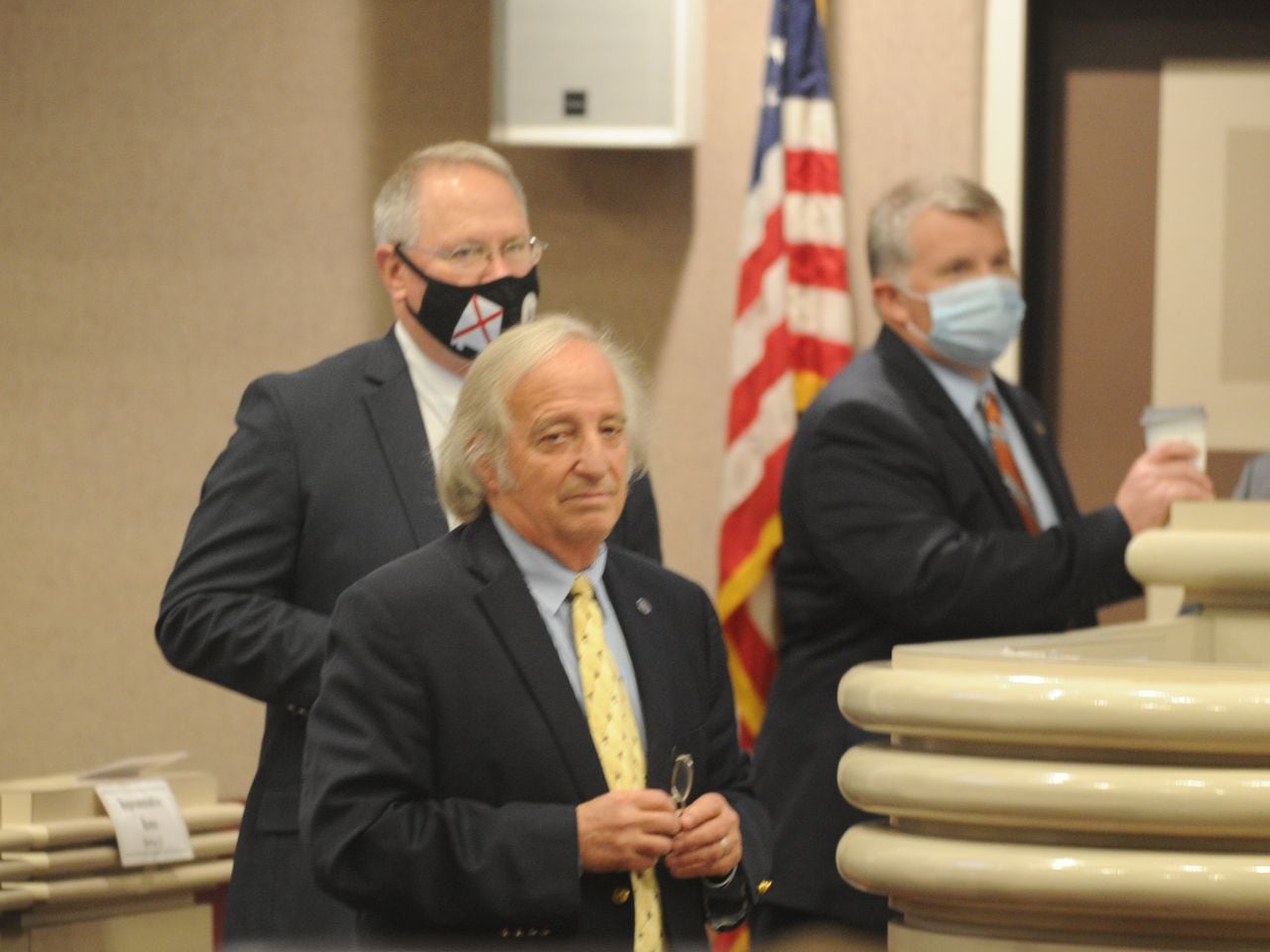
State Rep. Mike Ball, R-Madison, on the Alabama House floor on Thursday, May 6, 2021.
Efforts have come up in recent years to make changes to the law.
Retired State Rep. Mike Ball, a Republican from Madison who led efforts to get medical marijuana approved in Alabama in 2021, also backed legislation that year that would have allowed grand jury witnesses to discuss their testimony and experiences with prosecutors.
Ball argued at the time that the state’s grand jury secrecy law takes away First Amendment rights.
“The grand jury secrecy act really needs a lot of work,” Ball said. “It is way too broad. They don’t prosecute people under it, but the threat of prosecution under a vague law has a chilling effect.”
Alabama is one of a few states where the law strictly forbids disclosing any grand jury details by witnesses.
Ball’s legislation stalled out in the Alabama Legislature after he said it was opposed by the District Attorneys Association, and Attorney General Steve Marshall.
“I tried to get our law to reflect federal law, but they didn’t want that,” Ball said, referring to federal law that does not extend secrecy provisions to witnesses.
“It’s important we protect the First Amendment,” Ball said, adding that the case involving the journalists in Atmore is “dodgy.” He accuses Billy, the Escambia County District Attorney, of opposing a political decision and that has led to the indictments against journalists for violating the grand jury secrecy law.
Montgomery County District Attorney Daryl Bailey, immediate past president of the Alabama District Attorneys Association, deferred comments about the application of the grand jury secrecy law in Mobile and Atmore to Barry Matson, the longtime executive director of the association. Matson did not respond to requests for comment.
Marshall’s office also did not respond to a request for comment.
Zieman, the spokesman for Blackwood in Mobile County, said the grand jury secrecy law doesn’t need to be tightened up or changed, adding that “it’s very clear.”
The law has withstood a recent court challenge that involved former Republican state Rep. Ed Henry of Hartselle. Henry, a grand jury witness, claimed he had information that could help aid former House Speaker Mike Hubbard during his public corruption trial but was unable from sharing that information because of a prosecutorial interpretation of the grand jury secrecy law.
A federal district court agreed, in part, with Henry and found that Alabama’s law was too broad and could be used in an unconstitutional manner. He also argued that his free speech rights outweighed the state’s interest in confidentiality under the grand jury secrecy law.
The federal court likened the Alabama law to a Florida law that was struck down 33 years ago. But a three-judge panel for the U.S. Court of Appeals for the Eleventh Circuit – which included former Alabama Attorney General Bill Pryor — ruled that Alabama was within its rights to suppress information learned during a grand jury proceeding.
Ball argues that the law can be used by prosecutors to silence anyone associated with a case.
“This grand jury secrecy act has a chilling effect on the First Amendment,” said Ball a former investigator and State Trooper. “There is foolishness that can be done with a grand jury and there is no way for anyone to discover it. The default position after a case is adjudicated is that people should be able to have a record and a recording, and someone should be able to review it. If there is a security reason and a witness needs to be protected, then the DA should explain why.”
He added, “The default reason should be transparent. But I’ve seen so many times when people use something secret to hide improper behavior. That doesn’t need to be.”
